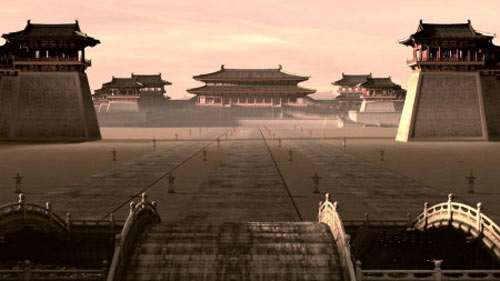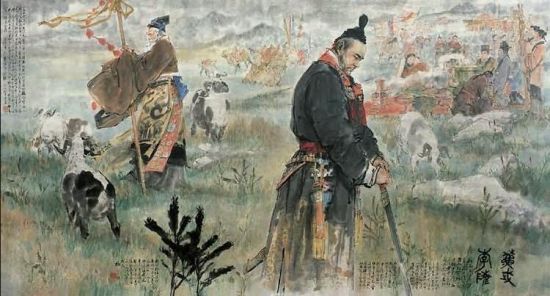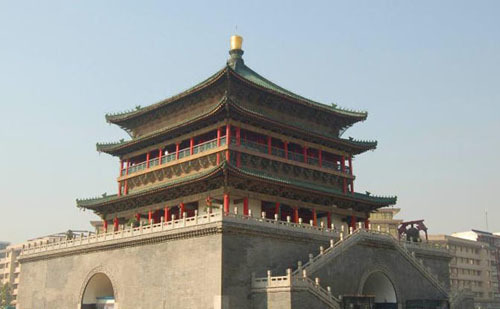Western Han Dynasty’s Strategies on Consolidating Centralized Ruling
5 min readThe tyranny and turmoil at the end of the Qin Dynasty had left a poor economic situation for the early Han Dynasty.The rulers of the early Han Dynasty learned th lessons from the extermination of Qin and applied a rehabilitation policy.Duringthe period of Emperor Wendi and Emperor Jingdi,the economy recovered and society stabilized,beginning the first peaceful period in Chinese ancient history.Based on this,Emperor Wudi of the Han Dynasty displayed his grand talents for furtherexploitation and development and reached the culmination of the Western Han.
The Western Han continued Qin’s basic grand unification policy while abolishing its tyranny.Moreover,some adjustments and renewals were made,further consolidating and developing the layout of the unified multiethnic country initiated by Qin.

Economically,rehabilitation was practiced with policies of reducing taxation and corvee,and awarding production.Liu Bang,Emperor Gaozu of the Han Dynasty,promulgated a range of favored measures including releasing soldiers to farmingfields,offering amnesty and enlistment of refugees,freeing servants and maids t suitable places,reducing and exempting corvee and setting the land rent at 1/15,resulting in a mass movement of population back to agricultural production.EmperorWendi applied agricultural and textile development to evaluate local officials and reduced the land rent to 1/30.These measures pushed the rapid recovery and development of agriculture.Emperor Wudi further promoted the official monopoly of salt and iron,collected industrial and commercial taxes,established buffer institutions to control prices,unified the currency,prohibited private coin casting and implemented other financial reforms.Thus,the country firmly grasped the economy and increased financial income,laying a solid economic foundation for a grand unified empire.

As for the state regime,the Western Han Dynasty experienced a process of ups and downs.In the early Han Dynasty,Liu Bang awarded some ministers with grand feats as vassals from different families.Fief and prefecture organization coexisted.The area of seven vassals’fiefs equaled half of the territory of the Western Han Dynasty.They had their own troops and constituted a threat to the imperial power.Liu Bang exterminated the vassals successively and subinfeudated his nephews.He hoped to rely on Liu’s families to defend the borders.With the passing of time,the vassals of the same surname gradually became more powerful and didthings in their own way.They established laws,collected taxes and tributes and cast coins without permission from the central government and were richer than the emperor.They even organized armed rebellions to challenge the central authority.

Emperor Jingdi’s acceptance of Minister Cao Cuo’s suggestion on“removing monarchs”aroused the joint rebellion of Wu,Chu and five other states.Emperor Jiingdi was forced to kill Cao Cuo to apologize to the seven states,but that didr t stop the attack from the rebel forces.Finally,General Zhou Yafu received the orders in face of danger and defeated the enemies.After putting down the rebellions,the court concentrated the vassals’power to the central government. Emperor Wudi learned the lesson from the rebellion caused by feoffing and promulgated the “fief expansion order”for further distribution of fief to greatly reduce the vassals’ might. He also divested 106 marquises of their ranks at one sacrifice ceremony on the pretext that the gold they presented was of insufficient weight and poor quality.
Meanwhile, Emperor Wudi also strengthened imperial power in controlling the central and local administrative institutions. To firmly control the country’s supreme power, he promoted some middle and lower officials to form a “centralcourt”to assist the emperor in decision-making, while the “outer court”1ed by the prime minister only took care of political affairs. The supervision system was an important part of the centralized political system and was greatly strengthened in the Han Dynasty. Emperor Wudi of the Han Dynasty established a position of Silixiaowei at the central level to supervise the behavior of officials and imperial members. He also divided the country into 13 supervision areas, which were called “13 state-departments,”and sent one Cishi to each state-department to inspect local officials, curb and attack the illegally rich people on behalf of the central government. Thus, the centralized regime was enhanced.
The rulers of the Han Dynasty practiced the recommendation system. The local officials recommended talents to the court, which appointed the recommended persons according to their capabilities with examination. The government enrolled persons with special reputations and capabilities to officiate in the court, which was named Zheng (enrollment). The practice under which a senior official recruited his subordinates was named Pi. The official selection system attached more importance to the capabilities of the recommended but could easily cause cronyism, consequently giving rise to phenomena such as the recommended scholar could not read and the recommended Xiaolian (filial to one’s parents and clean as an official) did not live with his parents.
To avoid decades of governance of an official in a local place that might resulted in corruption or setup of a separate regime, the Han Dynasty set years ofterms for major local officials, and the officials’ origins and any blood relations with their superior leaders would be considered as well.
The prevailing quiet and inactive Huangdi and Lao Tze Doctrine in early Han Dynasty had a loose ideological space, which was a departure from the growing centralization. The political situation during the reign of Emperor Wudi was stable, and the national power was strong. Hence, ideological control was strengthened. Emperor Wudi adopted Dong Zhongshu’s suggestion of “rejection of various philosophical schools and exclusive reverence of Confucianism.”Confucianism, which propagated centralized rule, obtained the position of the dominant official ideology. The policy penetrated into politics, ideology, culture and education, helping consolidate the centralization and attack local regimes. It had a far-reaching influence on intensifying the power of concentration of Chinese culture and the monarch’s control of popular thought.
The renovation measures concerning politics, economy, ideology and other aspects implemented by Emperor Wudi based on actual situation proved quite fruitful and drove forward the development of the unified multiethnic country initiated by Qin.








